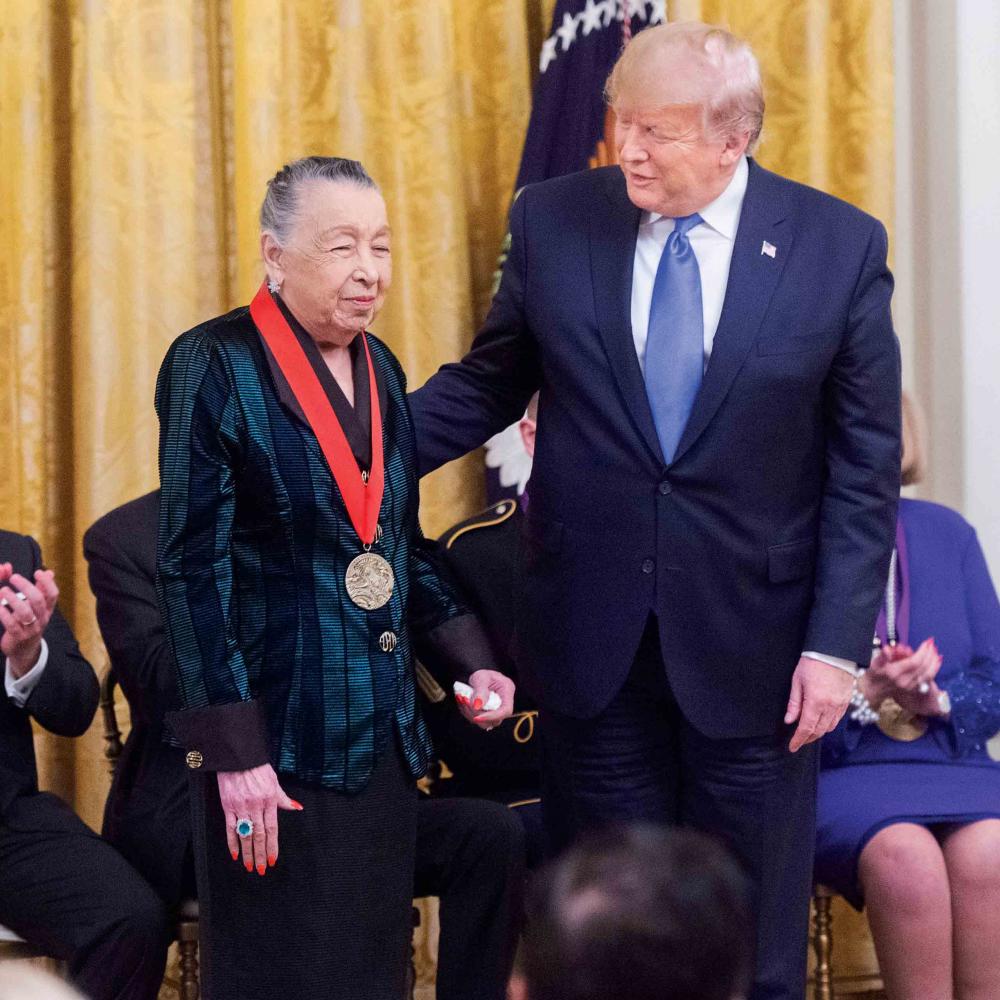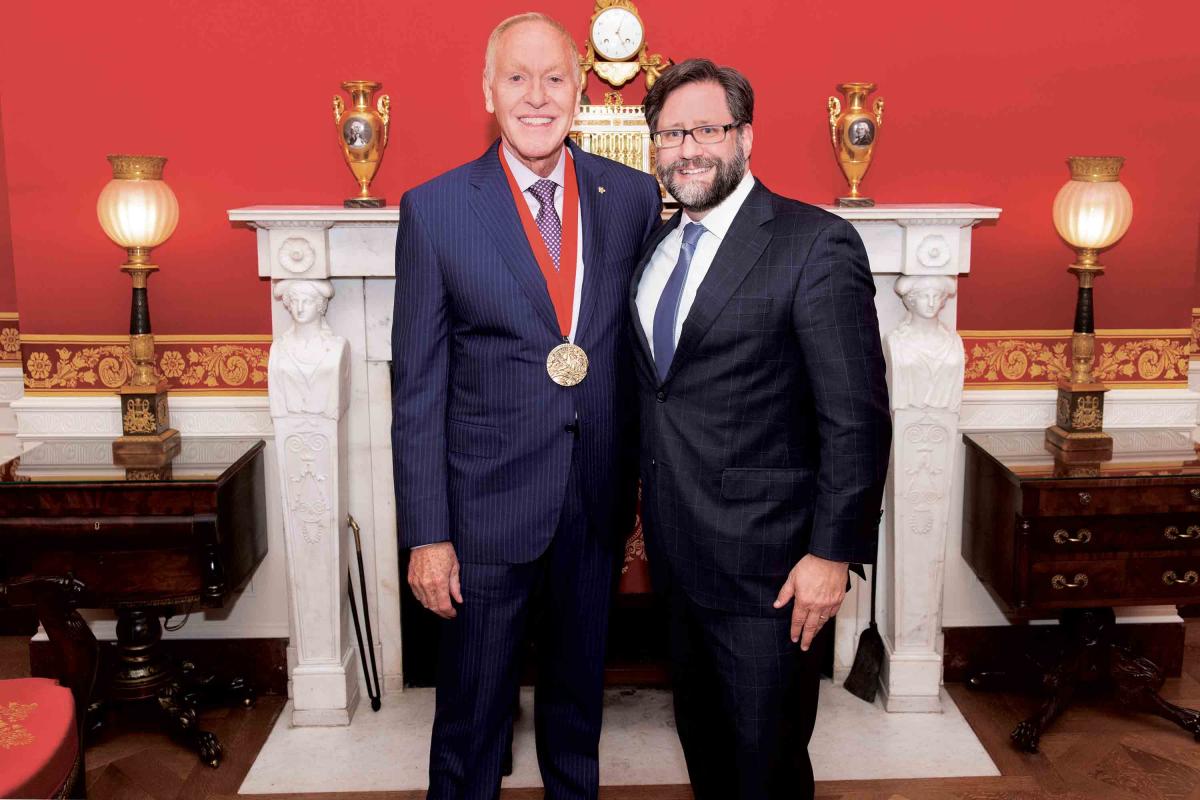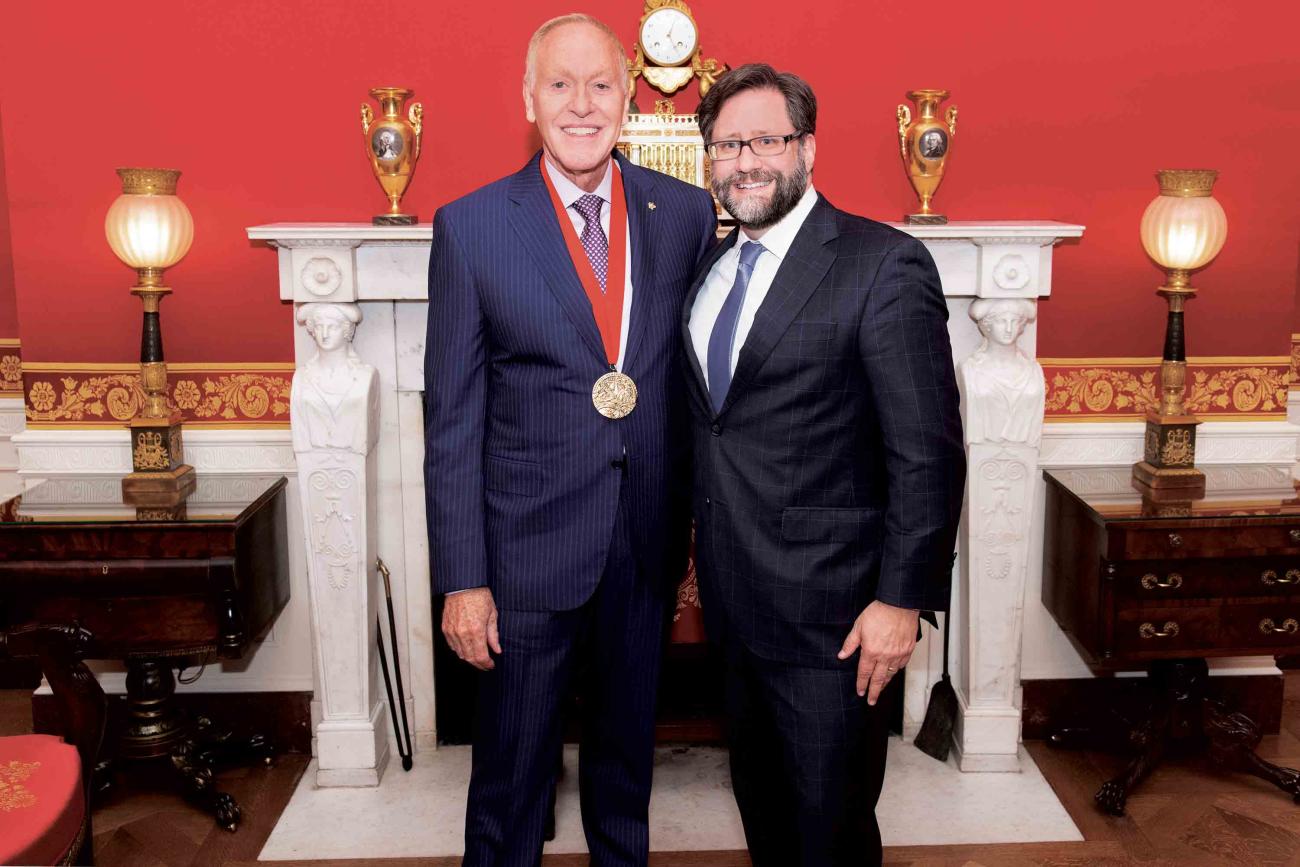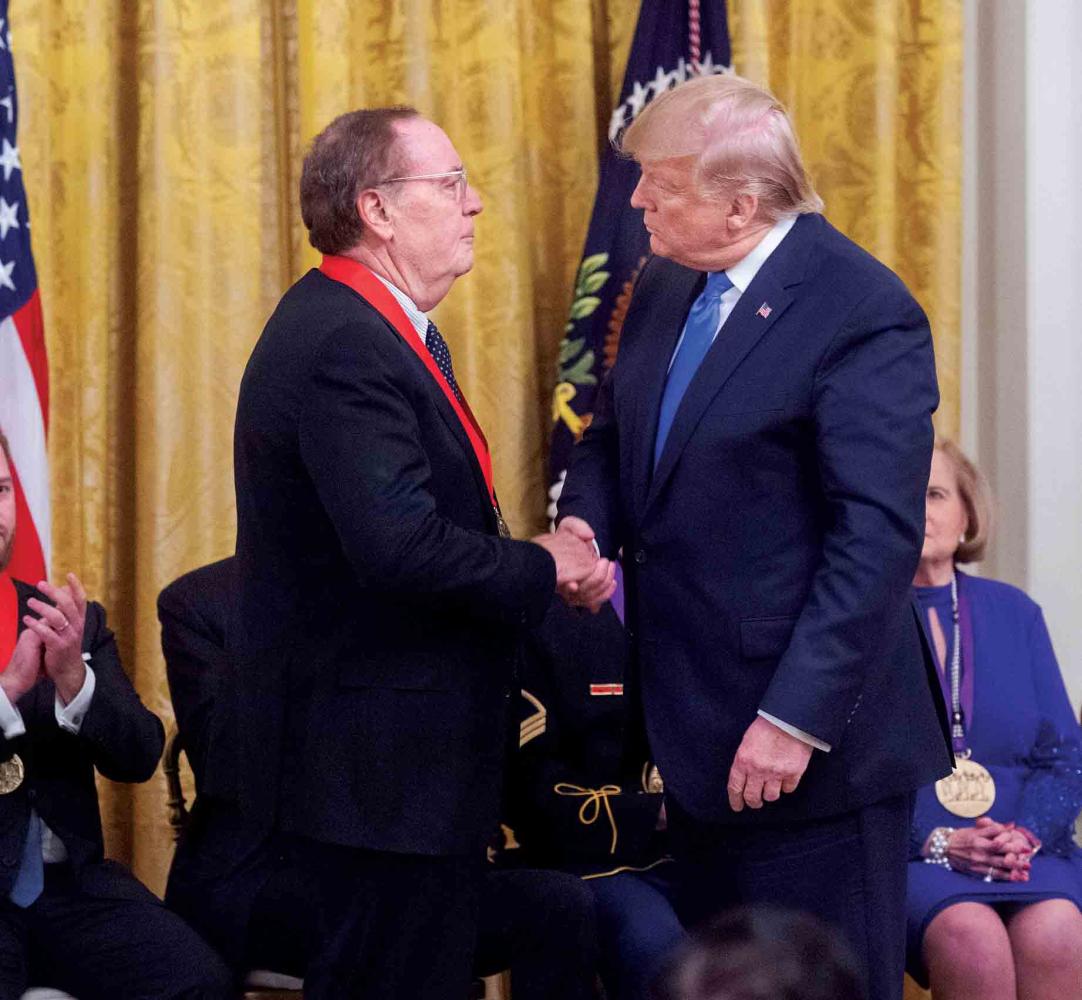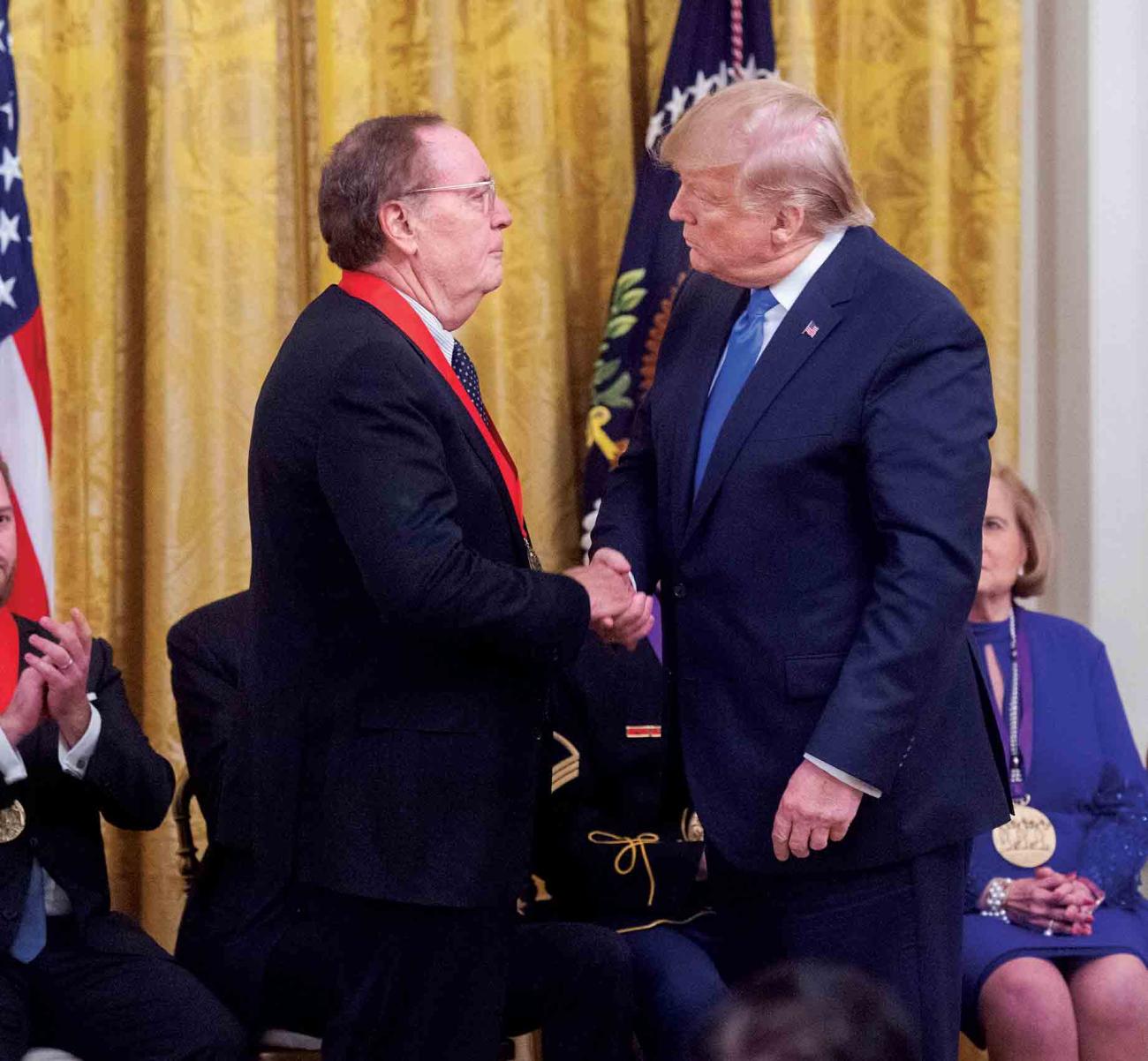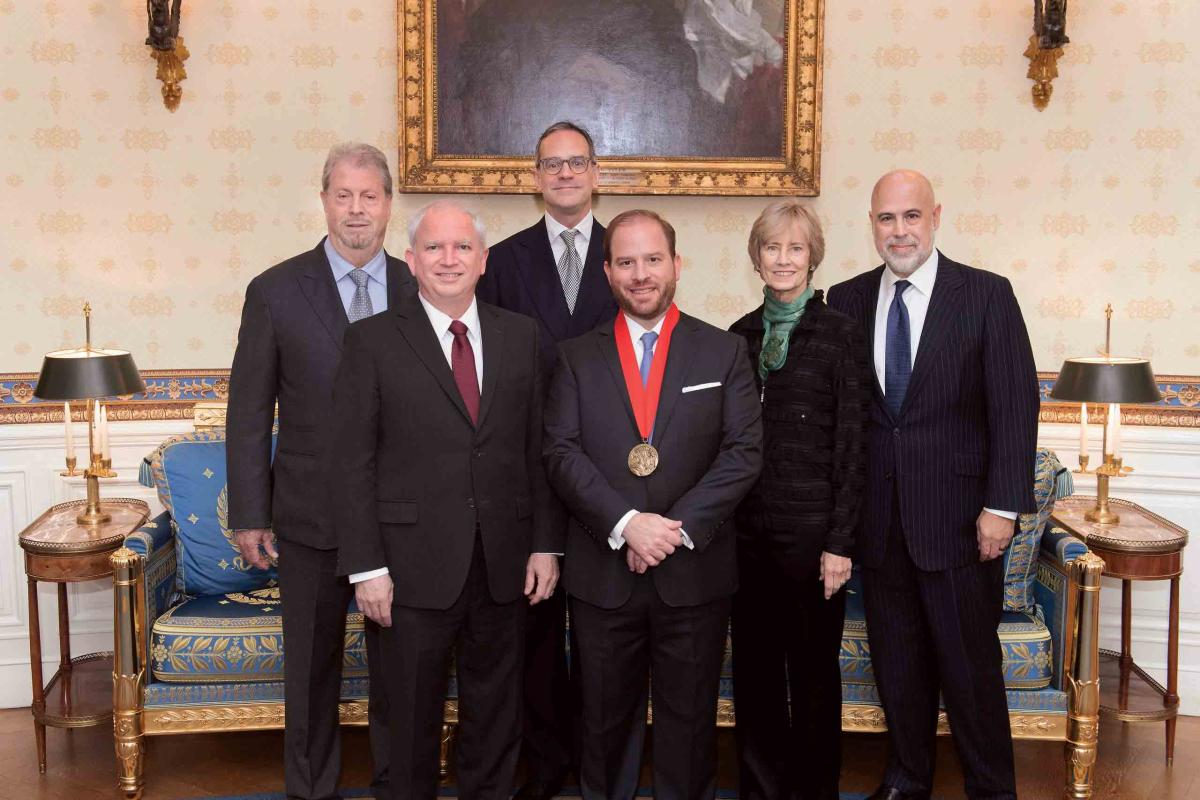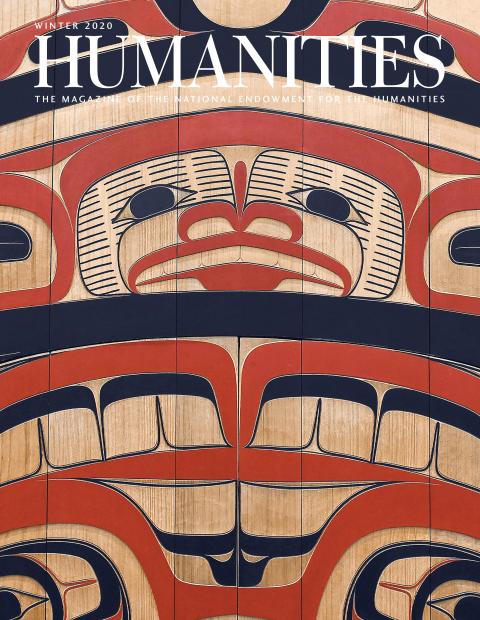On November 21, 2019, President Donald J. Trump was joined by Vice President Mike Pence, First Lady Melania Trump, NEH Chairman Jon Parrish Peede, Cabinet members, generals, and 150 supporters to award the National Humanities Medal to a philanthropist, a chef, a best-selling author, and a think tank. Together these four recipients represent the greatness of the humanities as expressed in education, cuisine, literature, and ideas.
Philanthropist Teresa Lozano Long
“ . . . for supporting the arts and improving educational opportunities . . . ”
Teresa Lozano Long was raised on a dairy farm in a small town in South Texas. As a girl, she took piano lessons and was exposed to culture but not inundated with it. She remembers a government program that distributed cards with famous works of art on one side and information about the artist on the back. On some cards were paintings she would later see in person on the walls of the great museums of Europe. She would even become a patron of the arts, but all that lay far in the future.
She was valedictorian of her high school, took a job as a teacher, and was working in the town of Alice, outside Corpus Christi, when she met her future husband, Joe Long, also then a teacher. He went on to law school and to work for the state securities board. She pursued degrees as well and became the first Hispanic woman to earn a doctorate in health and physical education at the University of Texas at Austin. Joe went into business for himself. He opened and then sold two commercial banks, and, as the couple prospered financially, they thought about what would benefit the people of Texas.
Education had made an enormous difference in their lives. Culture they both loved: art, opera, ballet. Health was another big concern. Too many bright Texans, they had noticed, left the state to attend college or medical school and didn’t come back.
“We didn’t have any children,” Joe told the Austin American-Statesman last year, “so I didn’t see any use just sitting here on a bunch of money. I don’t know exactly how much money we have given away, but it’s in excess of $150 million.”
In 1999, Teresa and Joe Long founded The Long Foundation, which supports programs that help children and young adults “improve their economic and social potential” through literacy, performing arts, college prep, and other educational opportunities. The foundation provides scholarships at several colleges and universities and has pledged $10 million to a permanent endowment to benefit Hispanic youth in Texas. Another major gift of theirs led the way in funding the creation of the Long Center for the Performing Arts in Austin.
Other philanthropic efforts of the Longs include a major gift to endow the Teresa Lozano Long Institute of Latin American Studies at the University of Texas at Austin, an acclaimed center that promotes cultural exchanges with Latin American countries, with the goal of improving mutual understanding across the border. Elsewhere at UT–Austin, students and scholars in law, education, and the liberal arts have been aided by the financial support of the Longs.
Their health philanthropy began in 1999 with a $1 million donation to fund scholarships for medical students from South Texas. The desire to fund more scholarships for medical and nursing students led to another major donation—$25 million to the University of Texas Health Science Center—in 2008.
In 2017, the Longs approached the University of Texas at San Antonio with a donation of $25 million, with $20 million going to faculty positions, another $4 million for student scholarships, and $1 million for an endowed chair at the Joe R. and Teresa Long School of Medicine. Hundreds of medical school students and former students have now been called “Long scholars” and “Long physicians” as a result of their training as medical professionals with the support of the couple’s generosity.
The Longs are both now in their nineties and have been married for 61 years.
Said NEH Chairman Jon Parrish Peede, “Teresa and Joe Long represent the American Dream writ large. Their generosity has created one of the nation’s most comprehensive Latin American culture centers for the benefit of scholars and curious visitors alike. I particularly appreciate their vision of the arts and humanities as anchors of a healthy society.”
—By David Skinner
Chef Patrick O’Connell
“ . . . for being one of the greatest chefs of our time . . .”
In 1978, visionary chef Patrick O’Connell took a dilapidated gas station in a tiny Virginia hamlet and began transforming it into a culinary empire. The Inn at Little Washington, 67 miles west of the nation’s capital in a town of about 150 people, has since been named one of the top ten restaurants in the world by the International Herald Tribune, and number one in North America and number two in the world by Travel + Leisure Magazine. In 2019, the Inn was awarded the Michelin Guide’s three stars, making it the first and only restaurant in the Washington, D.C., region to receive the honor.
The driving force behind the Inn’s continued excellence is O’Connell and his unending attention to detail. A native of the D.C. area, he attended the Catholic University of America to study speech and drama, then left to work in local restaurants. Although his parents urged him back to school, O’Connell found himself not cut out for campus life and headed out to travel through France. It was there that he found inspiration for a country inn that welcomed visitors with exceptional hospitality and refined cuisine.
O’Connell is a self-taught chef, a five-time James Beard winner and the recipient of the 2019 James Beard Lifetime Achievement award. “A preeminent culinary artist and trailblazing industry pioneer,” President Trump called him. O’Connell has authored three books, incorporating his take on American cuisine and the fascinating history of the Inn. He writes about his business philosophy, admitting, “I was supposed to have become an actor but soon found the living theater of the restaurant world more compelling than the stage.”
More than a chef, O’Connell is a restaurateur in the greatest sense, overseeing 17 acres of land, a 22-building Inn complex that takes up a good part of the town of Washington, a staff of 150 people, gardens and livestock (the elegantly designed chicken coop has a chandelier), and a voluminous kitchen modeled after the one in Windsor Castle, where special guests have dinner while watching the backstage show. The show usually starts with O’Connell’s signature truffle popcorn, served in miniature movie popcorn bags. Forbes describes the treat: “It’s tossed with parmesan, white truffle oil and sugar, then topped with fresh Burgundy truffles, gently shaved tableside by white-gloved servers.”
Before the farm-to-table movement became mainstream, O’Connell was sourcing local, seasonal food out of necessity and preference. Many food distributors wouldn’t deliver to the far reaches of Virginia, so O’Connell bought from local farmers and made good will with the local population along the way. The Inn now boasts a farmer in residence, who manages the chickens, sheep, llamas, and goats, and also “vegetable gardens, a dwarf cherry tree orchard, and a 672-square-foot greenhouse, all of which yield 8,000 pounds of the highest-quality produce annually” for the varied and inventive menu of Patrick O’Connell.
Wine magnate Robert Mondavi once called O’Connell the “pope of American cuisine.” Many great chefs have cut their teeth under O’Connell’s tutelage and demanding eye. The Inn’s many alumni include Tarver King, now the executive chef at the Restaurant at Patowmack Farms in Virginia. “It was like being in some weird, theatrical circus every day,” King told GW Magazine. “But it was serious and there was a lot that went into it and a lot of eyes on you, and you had to do things exactly right.”
“Historically . . . the only reason anyone became a chef was because they couldn’t get a real job, or they couldn’t speak the language, or they couldn’t do something that was considered more important or valuable,” explains O’Connell. “Then the profession seemingly overnight became glamorous. People who could have been brain surgeons or professors or rocket scientists suddenly entered the arena and everything changed forever.
“A new breed of American chefs have been brought into the field, who are resourceful, who have introduced a kind of playfulness in contrast to the usual stuffiness that we as Americans often found in grand European establishments. . . . It has created a kind of vivacious, unexpected excitement, full of surprise about what’s coming next on the culinary horizon.”
—By Amy Lifson
Author James Patterson
“ . . . for being one of the most successful American authors of our time . . .”
Among mystery novelist James Patterson’s highest priorities is his advocacy of reading, which the phenomenally successful and prolific author supports through philanthropy and direct support of the military, schools, universities, libraries, and independent bookstores. It’s “great partners,” he says, that make for good literacy programs. Patterson’s own son was a reluctant reader, but, through a bargain that swapped chores for an hour of reading each day one summer, the grade schooler evolved into an enthusiastic and self-motivated book lover. When Patterson isn’t plotting out his next mystery or thriller, he’s devising ways for the nation and readers of all ages to devour books.
Since his first book was published in 1976, Patterson’s output has been prodigious. He is perhaps best known for his Alex Cross series, which features a former Washington, D.C., forensic psychologist for the Metropolitan Police Department turned private psychologist and crime consultant. Two titles from the Alex Cross series, Along Came a Spider and Kiss the Girls, have been made into big-screen productions starring Morgan Freeman. Patterson has also produced the series Michael Bennett, Women’s Murder Club, Maximum Ride, Daniel X, NYPD Red, Witch & Wizard, and Private. He has won the Edgar Award, the BCA Mystery Guild’s Thriller of the Year award and the International Thriller of the Year award. By 2014, his books had sold more than 300 million copies, and the many titles that spring from his series along with stand-alone volumes have been estimated to account for one in seventeen hardcover books sold in the United States.
James Brendan Patterson was born in Newburgh, New York, in 1947, moved to Massachusetts with his family when he was in high school, earned a BA in English from Manhattan College and an MA, also in English, from Vanderbilt, and worked as an advertising executive until he began writing novels full-time in 1996.
Growing up, Patterson admits he wasn’t a big reader but was always a good student. “I read what I had to to be first in my class. Later I worked in a mental hospital. It was very stimulating. Robert Lowell used to check in there. He’d be in his room and basically give poetry readings. . . . I worked a lot of night shifts, and most nights there wasn’t too much going on, and I started reading like crazy and would go into Cambridge three or four times a week, and there were all these used bookstores there, and you could buy books for a quarter. . . . I just began reading like a mad person. And I fell in love with it.”
In 2005, Patterson established the PageTurner Awards to help spread excitement about reading. This award program evolved into the ReadkiddoRead website, which helps parents find books their children will really want to read. About his imprint for kids at Little Brown—JIMMY Patterson—he says, “My kids’ books are worth paying attention to. . . . Our mission is a simple one: When a kid finishes a Jimmy book they say, please give me another book.” Patterson has also set up teacher education scholarships at several universities and has taken out ads in Publishers Weekly and the New York Review of Books that boldly ask, “If there are no book stores, no libraries, no serious publishers with passionate, dedicated, and idealistic editors, what will happen to our literature?”
NEH Chairman Peede said, “A robust book culture is essential for our country, and James Patterson has contributed significantly as a creative writer and as a philanthropist to this very cause.”
—By Steve Moyer
The Claremont Institute
“ . . . for championing the Nation’s founding principles and enriching American minds . . .”
The Claremont Institute, said President Trump, “helps preserve our national traditions.” Its official mission is “to restore the principles of the American Founding to their rightful, preeminent authority in our national life.” A think tank located far away from Washington, D.C., in Upland, California, Claremont was founded in 1979 by a handful of students of the late political philosopher Harry V. Jaffa, whose views continue to shape the institute, its scholars, and its programs.
Influenced by the émigré thinker Leo Strauss, Jaffa emphasized the importance of founding principles in understanding the American regime. He broke from Strauss and others, however, who saw the American founding as essentially Lockean, centered on property rights and based on a low but solid view of human nature. Seeking a nobler view of the founding, Jaffa used words like virtue and excellence to describe its aspirations. He was fond of quoting George Washington on “the indissoluble union between virtue and happiness.” Abraham Lincoln’s speeches and thought were another touchstone. Jaffa’s 1959 book, Crisis of the House Divided, helped revive scholarly interest in the Lincoln-Douglas debates.
Following Jaffa, the Claremont Institute champions the view that the promises of liberty and equality before the law are written into the Declaration of Independence and expressed not only in the founding but, especially, in the Lincoln presidency. Claremont scholars such as Thomas G. West and others have sought to vindicate the Founders and show that their legacy has been under attack from more statist philosophies.
The Claremont Institute is home to about two dozen scholars who write penetrating articles and books on the American founding, Lincoln, the Civil War, progressivism, the administrative state, and the importance of statesmanship. It is also, however, a training ground for young thinkers and doers, recent college graduates as well as mid-career professionals in media, elective politics, government, and law, who visit as summer fellows and receive “a crash course in American political thought.”
“Our strategy has always been to teach the teachers and the opinion leaders and the policy makers,” says Claremont president Ryan Williams. This effort began in Claremont’s first year with the Publius Fellowship, a three-week program of seminars for recent college graduates. Today, Claremont also offers brief fellowships for journalists, law clerks, and even speechwriters, counting more than seven hundred alumni from its programs. The students, Williams says, are “public spirited and want to engage in a career that shapes the national political and intellectual conversation.”
A student of the second class of Publius Fellows, Charles Kesler went on to become a scholar at Claremont and, in 2000, editor of the Claremont Review of Books, a small-circulation journal that has become a significant venue for debate among political thinkers. Under Kesler, the well-written journal has published many distinguished contributors, such as Civil War historian Allen C. Guelzo, Claremont senior scholar William Voegeli, the National Humanities Medalist and coauthor of Who Killed Homer? Victor Davis Hanson, former White House speechwriter Michael Anton, journalist Christopher Caldwell, foreign policy analyst Angelo Codevilla, political theorist Diana Schaub, and best-selling novelist Mark Helprin.
While its paid circulation hovers around seven thousand, the Review boasts a high degree of influence in political and intellectual circles. Claremont also regularly hosts public events—talks, debates, and daylong institutes—on pressing questions of politics and ideas, in Los Angeles and Washington, D.C. However, says Williams, “the best metric,” by which to measure Claremont’s success, “is the extent to which we can teach people about the centrality of the principles of the Declaration of Independence.”
—By David Skinner

